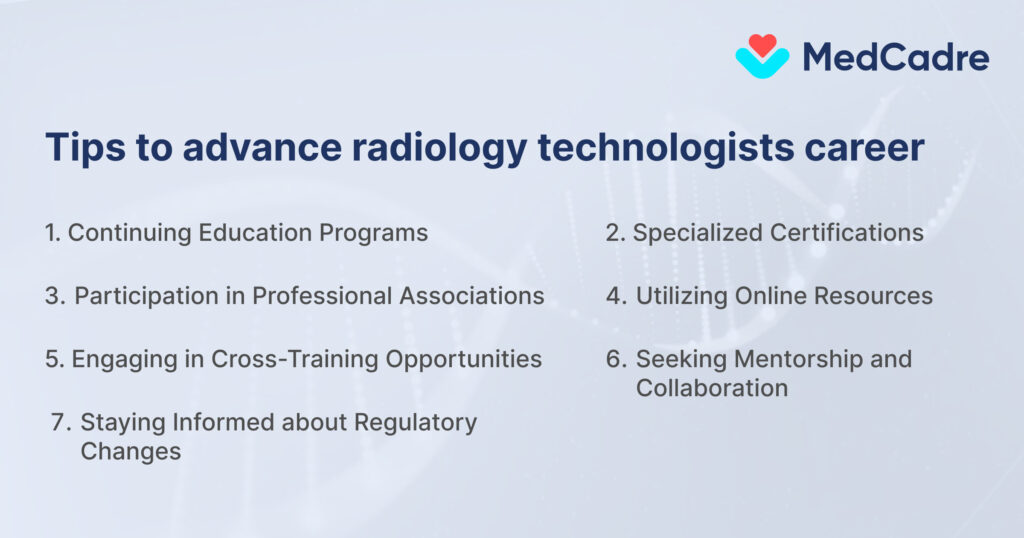Radiologic technologist play a crucial role in the field of healthcare, utilizing advanced imaging technology to assist in the diagnosis and treatment of various medical conditions. As technology continues to evolve, it is essential for radiologic technologists to stay up-to-date with the latest advancements in their field to ensure optimal patient care and advance their careers. In this article, we will explore professional development tips for radiologic technologists, emphasizing the importance of continuous learning and growth.
What are radiologic technologist and job responsibilities?
A radiologic technologist, also known as a radiographer or radiologic technologist, is a healthcare professional specializing in the use of medical imaging equipment to produce diagnostic images of the internal structures of the human body. These professionals play a crucial role in assisting physicians and other healthcare providers in diagnosing and treating various medical conditions.
The primary responsibilities of a radiologic technologist include:
- Performing Diagnostic Imaging Procedures
Radiologic technologists operate a variety of medical imaging equipment, such as X-ray machines, computed tomography (CT) scanners, magnetic resonance imaging (MRI) machines, and mammography equipment.
- Patient Positioning and Radiation Protection
Radiologic technologists are responsible for positioning patients appropriately to obtain clear and accurate images. They also ensure that patients and themselves are shielded from unnecessary radiation exposure by using lead aprons and other protective measures.
- Collaborating with Healthcare Teams
Radiologic technologists work closely with radiologists, physicians, and other healthcare professionals. They may discuss patient histories, explain procedures, and collaborate on the best imaging approach to aid in diagnosis and treatment planning.
- Quality Control and Equipment Maintenance
These professionals are responsible for ensuring the proper functioning of imaging equipment. This includes performing routine quality control checks, troubleshooting technical issues, and reporting any malfunctions for maintenance.
- Adhering to Safety and Ethical Standards
Radiologic technologists follow strict safety protocols to minimize radiation exposure to patients and themselves. They also adhere to ethical standards, maintaining patient confidentiality and upholding the highest level of professionalism.
- Documentation and Record-Keeping
Accurate documentation is a crucial aspect of the role. Radiologic technologists maintain detailed records of procedures, patient information, and imaging results, which are important for patient care, legal purposes, and medical research.
Educational requirements of radiology technologists
In the United States, individuals aspiring to become radiologic technologists typically need to complete an accredited educational program in radiography. These programs are offered by colleges, universities, and hospitals and can lead to either an associate’s degree or a bachelor’s degree in radiologic technology. Associate degree programs commonly take about two years to complete, while bachelor’s degree programs usually span four years. The curriculum includes a combination of classroom instruction, laboratory work, and clinical rotations to provide students with a comprehensive understanding of anatomy, physiology, patient care, and medical imaging techniques.
Additionally, students gain hands-on experience in operating X-ray machines, CT scanners, and other imaging equipment. Following the completion of their education, individuals often pursue certification through organizations like the American Registry of Radiologic Technologists (ARRT), which typically requires passing a certification exam. State licensure requirements may also apply, depending on the regulations of the state in which the technologist intends to practice. Continuous education and training are encouraged to keep radiologic technologists abreast of technological advancements and maintain their professional competence.
Important certifications for radiology technologists
- American Registry of Radiologic Technologists (ARRT)
The ARRT is the largest and most widely recognized certification organization for radiologic technologists in the USA. They offer a variety of certifications in different modalities, including radiography, magnetic resonance imaging (MRI), computed tomography (CT), nuclear medicine technology (NMT), sonography, and radiation therapy.
- American Registry of Magnetic Resonance Imaging Technologists (ARMRIT)
The ARMRIT is a non-profit organization that offers certification for MRI technologists. Their certification exam is designed to assess the knowledge and skills of MRI technologists in the areas of patient care, safety, image quality, and equipment operation.
- American Registry of Diagnostic Medical Sonography (ARDMS)
The ARDMS is a non-profit organization that offers certification for sonographers. They offer a variety of certifications in different areas of sonography, including general sonography, abdomen, obstetrics and gynecology, vascular, echocardiography, and pediatric sonography.
- Nuclear Medicine Technology Certification Board (NMTCB)
The NMTCB is a non-profit organization that offers certification for nuclear medicine technologists. Their certification exam is designed to assess the knowledge and skills of nuclear medicine technologists in the areas of radiopharmacology, patient care, radiation safety, and equipment operation.
Highest paying states for radiology technologists
| Rank | State | Average Annual Salary |
| 1 | California | $114,123 |
| 2 | Massachusetts | $92,285 |
| 3 | Hawaii | $88,440 |
| 4 | Oregon | $85,800 |
| 5 | New York | $84,350 |
| 6 | Connecticut | $83,570 |
| 7 | Maryland | $83,350 |
| 8 | New Jersey | $81,970 |
| 9 | Colorado | $81,440 |
| 10 | Illinois | $81,220 |
These salaries are based on data from the U.S. Bureau of Labor Statistics. The average annual salary for radiologic technicians in the United States is $72,568.
Please note that these are just averages, and salaries can vary depending on experience, location, and employer. For example, radiologic technicians who work in hospitals tend to earn more than those who work in outpatient clinics. Additionally, radiologic technicians who specialize in certain areas, such as MRI or mammography, may earn more than those who do not.
Employment and Job Outlook
- The median annual wage for radiologic technologists and technicians was $65,140 in May 2022. The lowest 10 percent earned less than $47,760, and the highest 10 percent earned more than $97,940.
- Employment of radiologic technologists and technicians is projected to grow 13 percent from 2020 to 2030, much faster than the average for all occupations.
- Job openings for radiologic technologists and technicians are projected to total 34,700 from 2020 to 2030.
- The need for radiologic technologists and technicians will be driven by the increasing use of imaging technologies to diagnose and treat diseases.
Tips to advance radiology technologists career

Continuing Education Programs
One of the most effective ways for radiologic technologists to stay current in their field is through participating in continuing education programs. These programs offer opportunities to enhance knowledge, learn about new technologies, and stay informed about the latest developments in medical imaging. Many professional organizations and institutions offer online courses, workshops, and conferences, allowing technologists to access valuable information conveniently.
Specialized Certifications:
Obtaining specialized certifications is an excellent way for radiologic technologists to demonstrate their expertise in a particular area of medical imaging. Certifications not only validate skills and knowledge but also open doors to advanced career opportunities. Examples of specialized certifications include Magnetic Resonance Imaging (MRI), Computed Tomography (CT), and Mammography. Pursuing these certifications can enhance professional credibility and increase the scope of practice.
Participation in Professional Associations:
Radiologic technologists should consider becoming active members of professional associations related to their field. Organizations such as the American Society of Radiologic Technologists (ASRT) provide a platform for networking, knowledge exchange, and access to resources that can aid in professional development. Attendees of association events and conferences often gain insights into emerging trends, best practices, and future directions in medical imaging.
Utilizing Online Resources:
The internet offers a wealth of resources that radiologic technologists can leverage for professional development. Online journals, webinars, and forums provide a platform for sharing experiences, discussing challenging cases, and staying updated on the latest research. Subscribing to reputable medical journals and joining online communities dedicated to radiologic technology can facilitate continuous learning.
Engaging in Cross-Training Opportunities:
To broaden their skill set and increase versatility, radiologic technologists can explore cross-training opportunities. This may involve acquiring proficiency in multiple imaging modalities or gaining expertise in related areas such as radiology administration or quality assurance. Cross-training enhances professional adaptability and can make technologists more valuable assets to their healthcare institutions.
Seeking Mentorship and Collaboration:
Establishing mentorship relationships with experienced radiologic technologists or other healthcare professionals can be invaluable for career development. Mentors can provide guidance, share insights, and help navigate the challenges of the profession. Collaboration with colleagues on research projects or process improvement initiatives can also contribute to professional growth and foster a culture of continuous improvement.
Staying Informed about Regulatory Changes
Radiologic technologists must stay informed about changes in regulatory requirements and standards governing their practice. Regularly reviewing updates from regulatory bodies, such as the American Registry of Radiologic Technologists (ARRT), ensures compliance with the latest guidelines. Being proactive in maintaining licensure and certifications is essential for career progression.
To advance their career, radiology technologists can significantly benefit from collaborating with leading healthcare staffing agencies, such as MedCadre. These agencies specialize in connecting skilled professionals with the most promising opportunities in the field, providing invaluable insights into the industry’s current demands and trends.
Launching radiologic technologist career with MedCadre
As a premier healthcare staffing agency in the USA, MedCadre boasts award-winning services that set it apart. Joining the MedCadre team not only provides a platform for professional growth but also offers a myriad of benefits for healthcare workers. One standout advantage is the compensation, which exceeds industry standards, ensuring that radiologic technologists are not only valued for their crucial role in patient care but also rewarded competitively for their expertise.
With MedCadre’s commitment to excellence and its reputation as a top-rated agency, individuals can trust that their career trajectory aligns with a company dedicated to providing unparalleled opportunities and recognition in the ever-evolving field of healthcare.
Highlights of benefits offered by MedCadre
- We offer PPO health insurance, optional dental, vision, and life insurance.
- Employees are eligible to join our 401k Plan.
- Travel expenses and per-diem benefits are available for traveling providers.
- Earn generous bonus for new employee referrals and recurring bonus for customer referrals.
- Training and development programs by in-house talents to match current job demands.
- Various assignments such as contract, per diem, long term, locum tenens, and more.
- Sick Pay is accrued at the rate of 1 hour for every 30 hours worked. Weekly payment plans are available.
- Basic life insurance is provided by the company with the option to extend coverage.
- HR, Payroll, and Timesheet concerns will be handled by dedicated teams in a timely manner.
How to get started- Explained in a few steps
- Navigate to our website by clicking on the provided link: MedCadre.
- On the “Find Job” page, complete the form with your essential information.
- After submitting the form, our team will review your CV and compile a shortlist.
- Expect a call from our executives in the near future. We look forward to connecting with you and discussing potential opportunities.
Conclusion
In the rapidly evolving field of medical imaging, radiologic technologists must prioritize continuous professional development to stay at the forefront of their profession. By adopting a proactive approach to professional growth, radiologic technologists can ensure that they remain competent, confident, and well-prepared for the challenges and opportunities that lie ahead in their careers.
We are thrilled to extend a warm welcome to you, inviting you to join our compassionate team that offers boundless opportunities and possibilities. Explore esteemed radiologic technologist jobs with our reputable clients by sharing your CV with us today!


